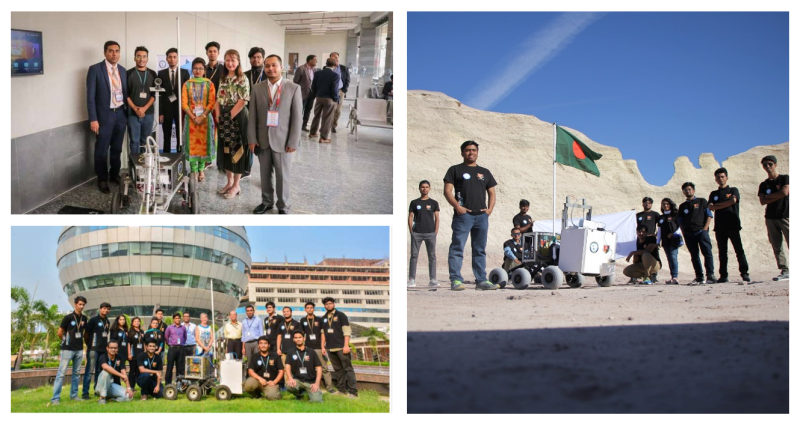AIUB Robotic Crew (ARC)
The University Rover Challenge (URC) by the Mars Society is a robotics competition for university-level students that challenges teams to design and build a rover that would be of use to early explorers on Mars The competition is held annually at the Mars Desert Research Station, outside Hanksville, Utah in the United States. The site was selected by the Mars Society for its geographic similarity to Mars: In addition to being a largely barren desert area, the soil in the area has a chemical composition similar to Martian soil.
The aim of the University Rover Challenge is to encourage students to develop skills in robotics, improve the state-of-the-art in rovers, and work in multi-disciplinary teams with collaboration between scientists and engineers. The competition was launched in 2006 with competitions held annually every summer since 2007.
Specific scenario details change each year as teams master given tasks and to encourage flexibility in designs and improve the capabilities of the rovers each year. Rovers are required to perform teleoperated or autonomous tasks that would assist astronauts in the field. Tele-operated tasks are performed from control stations with no direct view of the rover, only what can be determined via video and data links from the rover or sensors deployed by the rover. It is assumed the operators are also on Mars so there is no time-delay in communications.
The competition challenges student teams from all over the world to design and build the next generation of Mars rovers that will one day work alongside astronauts exploring the Red Planet. AIUB Robotic Crew is the only team from Bangladesh at MDRS to compete for the fourth time in a row.
The journey this team has embarked upon over the course of 4 years has seen the members evolve in knowledge and experience, while also encouraging the later generation of new members to come together to build a rover capable of traversing an extraterrestrial planet and conducting scientific studies on its surface.
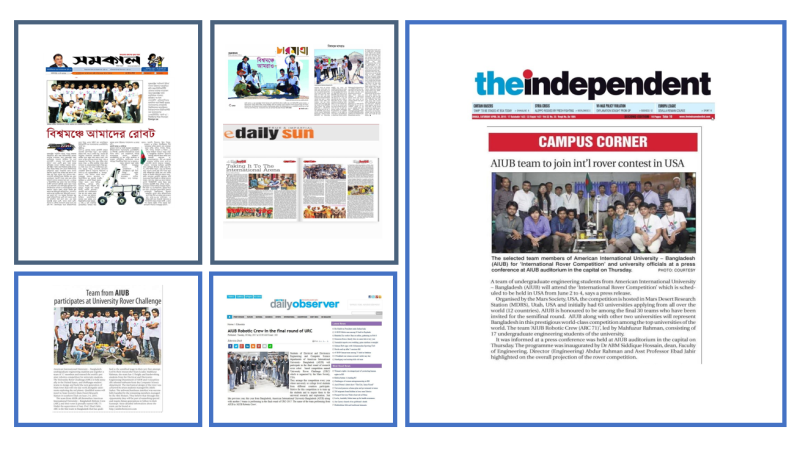
Meet the team
Team of 2016:
The very first team of AIUB Robotic crew was a milestone for the university. According to the Phobos
final, they stood 8th position among the participants from all over the world.
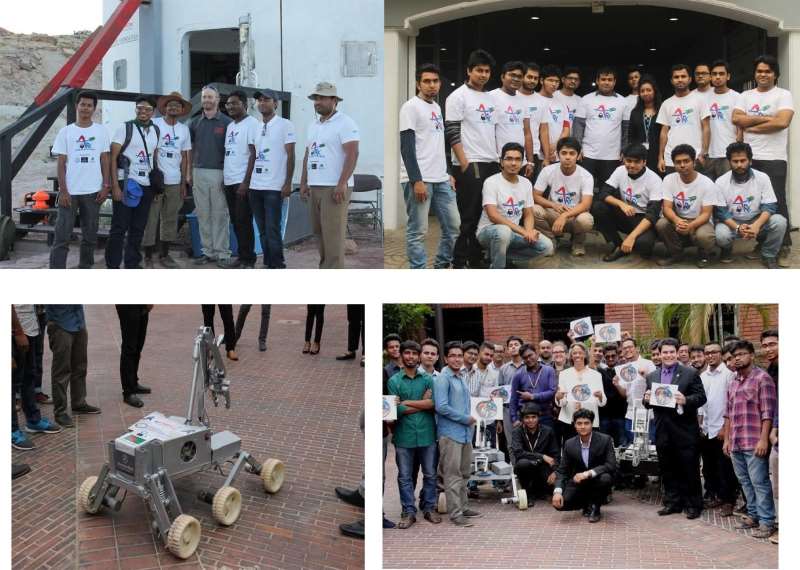
(From top-left) AIUB Robotic Crew at the competition site in MDRS, Hanksville, Utah, USA. (Bottom-left and right) AIUB Robotic Crew was invited to display their rover at the US embassy.
Team of 2017:
From the success of the 2016 team, ARC 2017 team was built. The CDR (Critical Design Review) is a
competitive milestone in which teams scores matters to advance for the final competition. Team 2016 got
2nd highest mark on CDR. Overall 32nd all over the world.
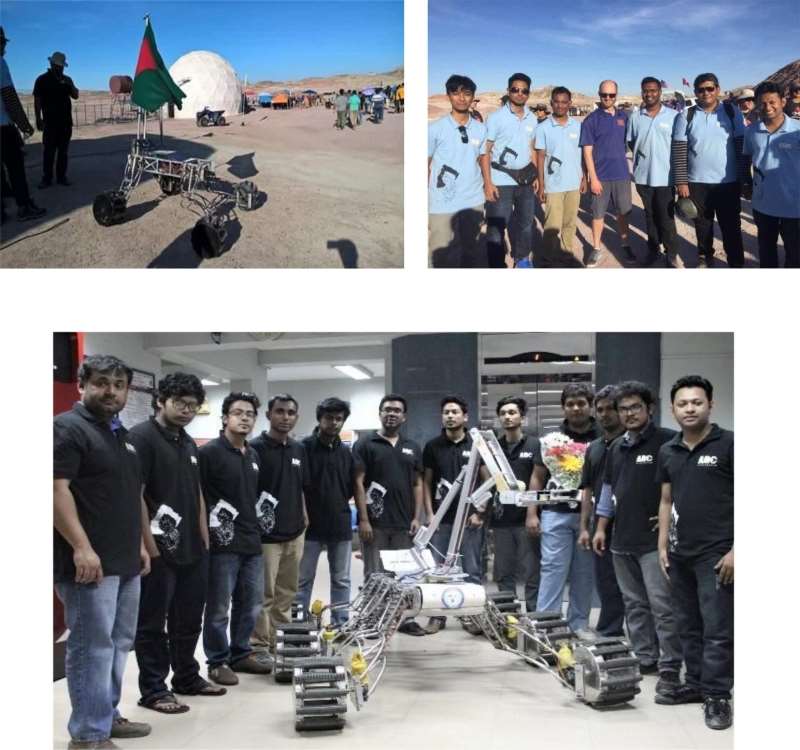
(From top-left) AIUB Robotic Crew returning for the 2nd time at Mars Desert Research Station (MDRS), Hanksville, Utah, USA.
Team of 2018:
With 14 Electrical students along with 5 Computer science students, ARC 2018 team was built. Among 93
teams from all over the world, team 2018 stood 26th. ARC 2018 has set a mark doing lots of outreach
programs for students interested in robotics.
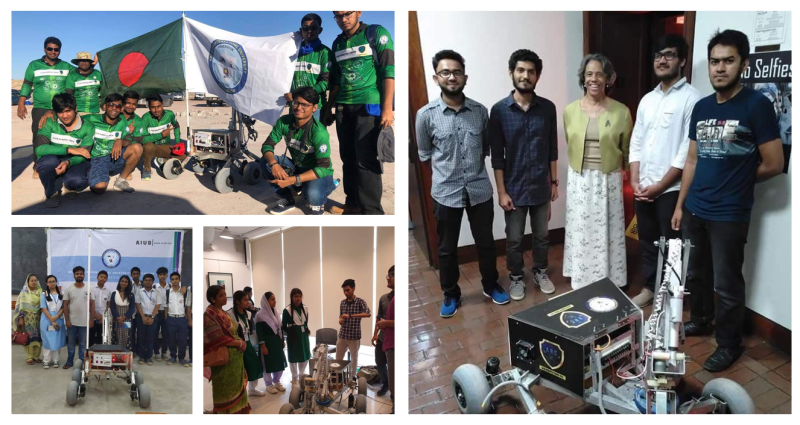
The team of AIUB Robotic Crew 2018 organized outreach programs for school students interested in robotics. Pictures of a recently hosted outreach program are outlined below.

Team of 2019:
ARC 2019 team consists of 12 students from the Electrical & Electronic Engineering and Computer Science
department of AIUB. In 2019 AIUB Robotic Crew (ARC) qualified for the final round of the competition as
the top scorer among all the teams of Bangladesh. After the most competitive System Acceptance Review
(SAR) milestone in the competition's history, AIUB Robotic Crew (ARC) was one of the 36 teams from 10
countries that had been selected as finalists to compete at the 2019 University Rover Challenge (URC).
The SAR is a competitive milestone in which teams' scores are compared, and only the top 36 teams
advance. In 2019 an astounding 53 teams scored above the qualification standard from the previous year.
